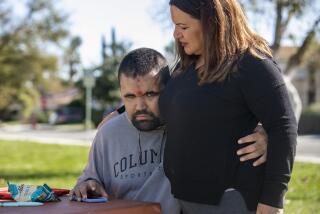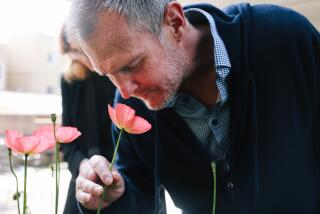A Family of Three
- Share via
In 1991, Harlen Trisdale was as alone as an 11-year-old boy can be. He had a brain disorder called autism, but nobody knew it. To his foster family, he was a strange, silent child who spent most of his time in his room. To his classmates, he was the one to pick on.
Then things changed: Donald Trisdale and his longtime partner, Ken Dyches, whom everyone calls by his nickname, Barry, took him into their home and became his legal guardians. Under their care, Harlen began displaying talents that surprised everyone. He graduated from Laguna Beach High in June 1998 with honors in math and chemistry and the principal’s award for outstanding achievement. Now he hopes to have a career in computer work.
Granted, Harlen has an uncommon form of autism, which affects roughly five in every 10,000 children and, at its worst, can cause a complete withdrawal from the world. He’s among the small percentage of autistic people who are able to function on their own, even becoming gifted musicians and mathematicians. So Harlen can memorize complicated chemistry equations, but he needs a note taped to the bathroom mirror to remind him to brush his teeth.
“I’m in awe of what Donald and his partner have done with this kid,” said Barbara Labitzke, executive director of Southern Area Fostercare Effort, an Orange-based nonprofit organization dedicated to improving the lives of foster care children in eight counties. “They’ve had incredible patience dealing with a person who was severely neglected and whose trust level was zero. To get a kid like that motivated is incredible. It’s made all the difference in Harlen’s world.”
Words still do not come easily to Harlen, now 19, but he’ll say this about living in Laguna Beach with his dads: “It made the difference between existing and being somebody.”
*
Trisdale met Harlen when the boy was in the seventh grade and living with a foster family. Both Trisdale and Dyches had joined the Orange County chapter of Court Appointed Special Advocates, or CASA, a national program that pairs trained volunteers with foster children who’ve been removed from their homes, usually due to neglect or abuse. The advocates represent the children in custody hearings and other welfare issues.
Trisdale was assigned to Harlen, while Dyches became an advocate for another boy, who has since been reunited with his mother. They began taking Harlen on weekend outings.
“I’ve been around a lot of troubled kids, but Harlen was the most difficult child I’ve been around,” says Dyches, who once was an administrator at a psychiatric hospital. “For many months, he hardly said anything. He was very scared and fearful of adults. It took a long time to reach him.”
Harlen cringed at the slightest touch, even if it was accidental. But it wasn’t just his brain disorder that caused him to avoid people; it was his upbringing. Harlen’s father was never a part of the boy’s life, and his whereabouts are unknown. His mother, who struggles with alcohol and homelessness, gave up her rights as a parent.
Social workers placed Harlen in a foster home, but he needed more attention and support than the family could provide. The Orange County Social Services Agency began to search for another home but couldn’t find one.
“Most homes wanted younger children without special needs,” Trisdale says. “The only recourse was to move Harlen to a group home, but that was very difficult for me. They are no substitute for having parents.”
Trisdale and Dyches always wanted to be parents and they had been approved to adopt a child through Social Services. They also had undergone the rigorous training and home certification needed to become foster parents--figuring it would be a quicker way to find a child to adopt. But the advocate program’s rules wouldn’t allow them to adopt Harlen, considering it a conflict of interest.
And they are an unconventional family. “I’m the first to say that a child belongs in a home with a mother and father,” Trisdale says, “but if that’s not possible, 1/8people with 3/8 alternative lifestyles can provide a loving environment, too.”
In their 50s, Trisdale and Dyches have been together 25 years. Dyches works as the regional administrator of Windsor Health Care Management in West Hollywood. Trisdale now is a public health educator and consultant.
“The more I thought about it, the more I realized that here was a child who really needed us, and we’d grown to love him,” Trisdale says. “There had to be a way around this.”
On Oct. 27, 1993, the day they told Harlen he’d be moving in with them for foster care, Trisdale and Dyches’ home was lost along with 440 others in a Laguna Beach firestorm.
They moved a mobile home onto their burned-out lot but, when that living arrangement proved impractical, they moved into a friend’s apartment, then a condo. Within a year, they moved into their rebuilt home.
That also was the year they became Harlen’s legal guardians. Social workers and members of the advocacy program’s board who knew of the couple’s three-year history with the boy all lobbied on their behalf. “The CASA board gave its stamp of approval, and Harlen became our son,” Trisdale says, who also had Harlen’s last name legally changed to Trisdale.
In the beginning, Trisdale and Dyches struggled to reach Harlen, who didn’t speak and was constantly touching his face. “He’d been diagnosed with brain damage, behavior disorder, attention deficit disorder. These were labels that they put on him that I could not accept 1/8because 3/8 he didn’t have the appropriate symptoms,” Trisdale says.
He took the boy to the UCLA Neuropsychiatric Hospital and Institute, where a specialist confirmed Harlen was autistic.
Autism begins within the first two years of life, according to the Autism Research Institute in San Diego. It has no known cure or cause, although researchers suspect that the environment, genetics and even a virus might play a role.
Harlen’s maternal grandmother told Trisdale and Dyches that, after he was born, Harlen would smile and laugh like an ordinary infant. “Then one night he went to bed and the next day he woke up totally different. It was like an electrical part of his brain just quit,” Trisdale says the grandmother described. “From then on, he cried all the time if you touched him. He didn’t want to be cuddled anymore.”
When Harlen came to live with them, Trisdale quit his job to become what he calls a “mom-dad.” Getting Harlen through school was more than a full-time job. “He was mainstreamed. I would not allow the school to isolate him,” Trisdale says, and they also made sure he did his homework.
But Trisdale and Dyches wanted more for their son than academic honors. Like all parents, they wanted their child to have friends. Children often point out anyone who looks different, and Harlen had always been an easy target. “He used to look rundown,” Dyches says. “His clothes were shabby, his hair was unkempt and he never took a bath on his own.”
When Trisdale and Dyches met him, Harlen’s teeth protruded. One of their first acts as parents was to get Harlen braces, which he wore for four years. To help Harlen adjust, Trisdale got braces, too.
Harlen also became manager of the school football team. For a year and a half, he ran errands and stocked equipment. The players became his protectors.
“Harlen won their support and their respect,” Trisdale says. “No one was going to touch Harlen” anymore.
He also enrolled in the Young Conservatory program at the South Coast Repertory in Costa Mesa. Every Saturday morning for three years, Trisdale would drive Harlen to the theater so he could perform small roles in skits and plays as part of the theater’s drama tutorial.
“It was the best thing in the world for him. He could be different characters and take on different roles,” says Trisdale. “It provided a way for Harlen’s inner self to become his outer self. His communication skills escalated.”
Encouraged by Harlen’s high school successes, Trisdale and Dyches enrolled Harlen at the Rochester Institute of Technology in New York last year, but he withdrew after two quarters and came home. The school was accustomed to working with special-needs students, but could not offer enough support for Harlen.
Still, Harlen’s days at Rochester yielded an unexpected benefit. While at the college, Harlen got a computer and found that e-mails allowed him to speak his mind in a way never before possible.
“We talked more while he was in New York than the whole time he lived at home,” Trisdale says. “We’ve gone from darkness to light with that computer.”
Harlen wants to study computers and perhaps work as a Web site designer or manager eventually. But for now, Harlen works in the stockroom of the Housing and Urban Development office in Santa Ana. His parents, who have moved to Los Angeles, are trying to find housing for Harlen in Orange County, so he can take more computer classes at UC Irvine.
They’ve toured a few group homes, but none had the kind of family environment they want for Harlen, so they hope he will be able to move into an apartment with a roommate and get help with budgeting and laundry from some type of assisted-living service.
“He needs someone to remind him that it’s the weekend and he needs to wash his clothes,” Trisdale says. “I worry about my child, just like most parents do, but I worry more so. I’ve always been his interpreter, his champion. Will someone 1/8else 3/8 really understand Harlen?”
More to Read
Sign up for Essential California
The most important California stories and recommendations in your inbox every morning.
You may occasionally receive promotional content from the Los Angeles Times.













